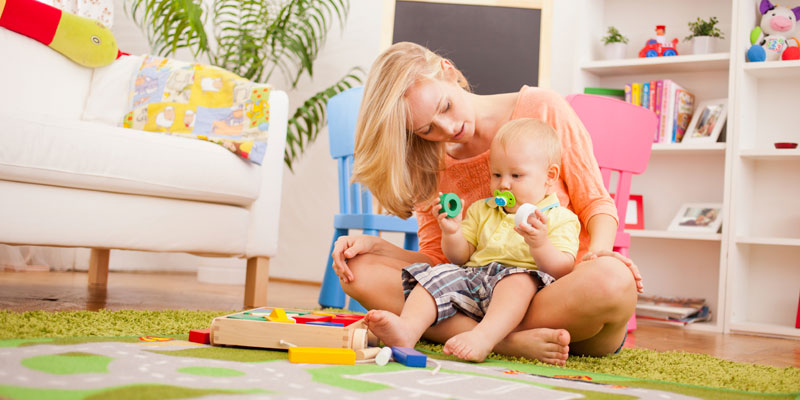
So Many Ways to Explore the World
People view the world through their senses and with simple experiments (e.g. What happens when I do this?), and babies are no different. By 9-12 months, your baby’s Small Muscle Movement and Dexterity skills are becoming more and more advanced. He will experiment and explore with his hands and senses, using them as a scientist does to develop an understanding of the world around him.1 One experiment he will enjoy carrying out is placing objects into containers, such as putting blocks into boxes or stacking nesting cups together.2 He will also have a lot of fun emptying the boxes, as well as poking his fingers through holes in the containers to explore the hidden contents inside.
(SPECIAL OFFER: Sign up for Playful Bee’s Bee Well developmental learning program to give your baby the best start in life. The first 10,000 children enroll for FREE! Sign up today.)
At this age, your baby will be experiencing an increased sense of independence as he develops his Self-Concept skills. This shows itself in a number of ways, including his enjoyment of his ability to feed himself, first with his fingers and then with utensils. These independent eating skills are a result of his stronger and more coordinated pincer grasp, powered by his thumb and forefinger.2 As a result, you will find your baby eating finger foods (e.g. puff cereal and small pieces of soft fruit, such as bananas) more skillfully, picking up a spoon to try to scoop pureed foods into his mouth, and attempting to hold and drink from a cup.3
At the end of the 9-12 month period, your baby will begin to explore writing and drawing as a way to communicate.4 He’ll start to take an interest in using writing and art tools, such as crayons, markers, and finger paints, to scribble and “draw.” Be sure to encourage his art work and the use of different materials! Not only will it expose him to the different results of using a variety of materials, but the extra practice will develop his Early Writing skills more quickly.
Play Tips:
Do you want to know how you can support your baby’s development of these Small Muscle Movement and Dexterity skills at this age? It’s easy! Read on for some simple tips to incorporate into your daily play time together.
- Provide a variety of objects to bang together and drop into containers.2 Allow your baby to experiment with different toys and objects that make sounds when he bangs them together or that can be placed in and dumped out of containers. Model how to use the objects. Consider using large beads, plastic or wooden blocks, or wooden puzzle pieces to handle and play with. Be sure to supervise him during these activities and avoid small objects that can be choking hazards.
- Let your baby self-feed himself.1 He can now feed himself with more skill, successfully using his fingers and/or utensils to get food into his mouth. In the short term, he may make a mess, but he will improve with more practice and proper encouragement and support. Be patient as these self-feeding efforts will help your baby build stronger fine motor skills, independence, and self-esteem.
- Offer opportunities to scribble and draw.4 Provide your baby large sheets of paper and wide crayons and washable markers to explore scribbling, observe colors, and create marks and shapes.
(SPECIAL OFFER: Sign up for Playful Bee’s Bee Well developmental learning program to give your baby the best start in life. The first 10,000 children enroll for FREE! Sign up today.)
Developmental Milestones:
Has your baby achieved the following Small Muscle Movement and Dexterity and Hand-Eye Coordination developmental milestones yet? If yes, check off all the skill(s) she has already mastered to date using Playful Bee’s developmental milestones tracker. It’s absolutely FREE and easy to use, just click HERE!
- Fits one object into another.
- Bangs objects together.
- Begins to feed self finger foods.
- Picks up objects with pincer grasp (i.e. thumb and finger).
- Pokes at holes with index fingers.
- Begins to scribble.
Sources:
1Washington State Department of Early Learning (2012). Washington State Early Learning and Development Guidelines: Birth through 3rd Grade.
2Maryland State Department of Education (2010). Healthy Beginnings: Supporting Development and Learning from Birth through Three Years of Age.
3Florida Partnership for School Readiness (2004). Florida Birth to Three Learning and Developmental Standards.
4Public Broadcasting Service. Baby Writing Milestones. PBS Parents. Retrieved January 31, 2014, from http://www.pbs.org/parents/education/reading-language/reading-milestones/baby-language-development-milestones/baby-writing/.
Playful Bee
Latest posts by Playful Bee (see all)
- Have a Super Fortune Cookie Friday! - February 9, 2018
- All Kinds of Shapes: Your Child Is Learning Simple Shapes, and Drawing Them Too! - November 13, 2017
- Fishing for Sneakers: Create your own Hand-Eye Coordination Fun - November 11, 2017

+ There are no comments
Add yours